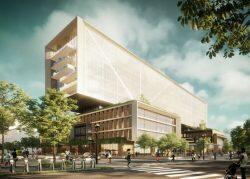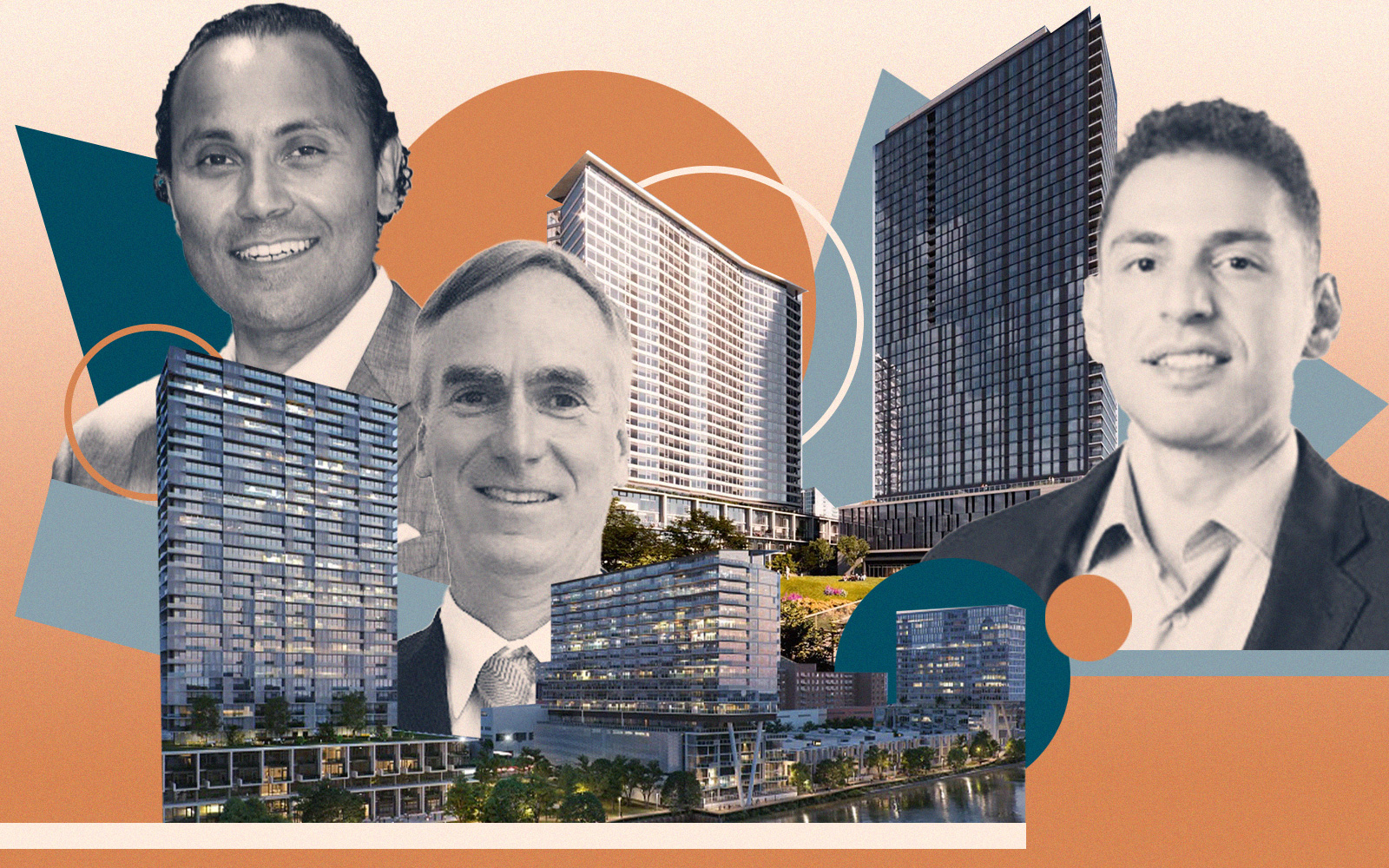Scott Goodman isn’t one for chest pounding.
Rather than talking up the $4 billion Bronzeville Lakefront project by a coalition of developers led by his firm, Farpoint, Goodman started off Wednesday’s groundbreaking ceremony by sharing his emotions in front of a crowd of his colleagues and Chicago’s outgoing Mayor Lori Lightfoot, who attended after the event was postponed in the wake of her election defeat.
The ceremony was originally scheduled just two days after the incumbent mayor was shut out of the runoff. But Goodman’s tears weren’t caused by unsettled dust carried by the Windy City’s air of political change blowing outside the Prairie Shores apartment community on South Martin Luther King Drive, which sits across the street from the vacant 48-acre site that was formerly home to the Michael Reese Hospital and where Bronzeville Lakefront will rise.
Instead, the developer and co-founder of Sterling Bay — the firm he left in 2016 to start Farpoint — was touched when recalling rodding pipes in Prairie Shores, a 1,675-unit property he said made up the largest account of his father’s plumbing company. Farpoint and Golub & Co. bought the five-tower asset for $180 million in 2019, in part to help ensure no one could interfere with the megadevelopment next door.
“Almost 50 acres of basically lakefront property available just a couple miles from the central business district of a major urban area like Chicago shouldn’t be available for development in 2023, but here we are and we get to do that,” Goodman told The Real Deal.
Fond farewell
With early voting underway throughout the city ahead of Tuesday’s final showdown between Brandon Johnson and Paul Vallas, political undertones peppered the groundbreaking. It served as an unofficial real estate industry sendoff for Lightfoot. Goodman predicted her Invest South/West initiative, which aimed to lure more private developers to traditionally neglected communities on the city’s South and West sides, would be her legacy.
When Lightfoot got on the mic, she belted out one of her famously fiery responses as Leonard McGee chimed in during the mayor’s speech that Bronzeville’s traditional boundaries included the site of the event after she called the area “technically Prairie Shores.”
“Thank you sir, I’m not in church and this isn’t call and response,” Lightfoot said.
In addition to a sense of drama at the event, the twists and turns the city has steered the property through demonstrates the heightened influence of politics on development in Chicago compared to other large cities.
Goodman and his team acknowledged another challenge in navigating its relationship with a new administration, which could have profound influence on the fate of Bronzeville Lakefront. His Farpoint-led coalition known as GRIT is buying the site from the city in phases for $97 million.
Ironically, as Fourth Ward Alderman Sophia King — one of seven candidates who ran against Lightfoot — thanked the mayor for her efforts on the project, which included approving $60 million in public funding for the project’s infrastructure, an ad featuring King endorsing Vallas for mayor played on a television tuned to CNN in the background of the event.
During her speech, King also described McGee, a volunteer member of the Michael Reese Advisory Council that has worked alongside GRIT on planning Bronzeville Lakefront, as the “unofficial official leader of this project.”
Earlier this month King became the subject of controversy. She’s been accused of threatening to kaibosh a data center development being eyed by Equinix on land adjacent to the Bronzeville Lakefront project, according to a federal lawsuit. The property’s investors filed the suit and claim King used her power to force a sale of the asset to Goodman’s team for $15 million instead of the $30 million Equinix was reportedly willing to pay. It names Goodman and the Lightfoot administration as defendants.
The GRIT team declined to comment on the suit. But in a November interview with The Real Deal, Regina Stilp, Goodman’s longtime partner from his Sterling Bay days who joined him to form Farpoint, complemented King’s negotiation skills displayed while getting her blessing for Bronzeville Lakefront.
“She’s tough, but she negotiated probably the best deal for her community and that’s what she should be doing,” Stilp said.
Third time’s a charm
Goodman is getting ready to go to bat again for his Bronzeville Lakefront vision with a third mayoral administration as the city’s transition of power takes place. He’s still in the box after fending off a casino pitch by Bally’s on land Farpoint’s coalition has the right to purchase. And he swung and missed on his own casino bid at the Lakeside Center property. (Lightfoot selected Bally’s other bid for the Chicago Tribune’s Freedom Center printing plant site for Chicago’s first casino.)
“Obviously we’re supportive of whoever wins the mayoral race,” Goodman said in an interview. “This is a city we adore. Whomever the mayor is next, this is a very important piece of property and it’s important the right things happen to it and we’re very confident we have the right plan for it and will get their support.”
The city had already incurred two strikes against the Michael Reese property before GRIT was awarded the option to buy it by the Rahm Emmanuel administration. Chicago borrowed $85 million to acquire it in 2008, when the hospital was shuttered, and angled to turn the site into an Olympic Village as part of its bid to host the games in 2016. That didn’t work out as the Olympics went to Rio De Janeiro.
Then, Amazon started the hunt for its HQ2, and Chicago offered up the site to the e-commerce giant. Around the same time, within the Chicago development community, Goodman and Stilp were in the process of jumping from Sterling Bay to start Farpoint.
“Farpoint is intended to be less of a behemoth,” Goodman said in an interview.
Among the approximately 7 million square feet of retail, commercial space and public amenities planned for the project is a 500,000-square-foot structure set to be built in its first phase. A newly formed venture called the Chicago Arc Innovation Center has committed to leasing a quarter of it, with the backing of Israel-based Sheba Medical Center, which will partner with startups from foreign markets and those spun out of local universities to provide life sciences and health innovation companies in their early funding stages a place to work on proving their concepts that’s open to investment from the U.S.
Additionally, the Bronzeville Lakefront project will hold 5,000 residential units, including 1,000 considered affordable, as the megaproject is completed by 2037. And it’s not just housing that will be affordable: 10 percent of the retail space within the development will be reserved for local and disadvantaged business owners who will be eligible to pay 20 percent less than market rate to set up shop on the property, Lightfoot said.
“I can perceive the change in gravity of the city of Chicago moving south. You can’t do anything else of this scale on the North Side,” Goodman said.
Read more



